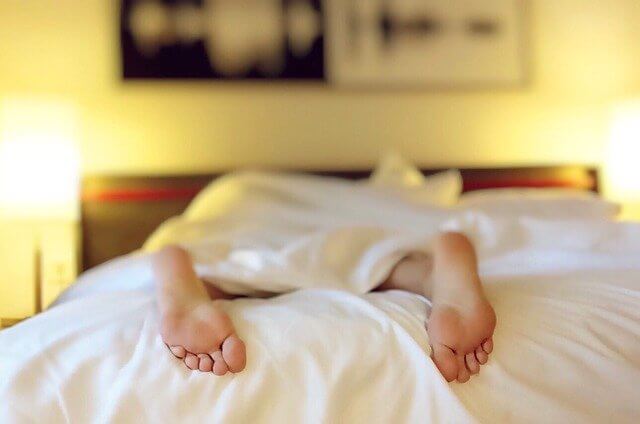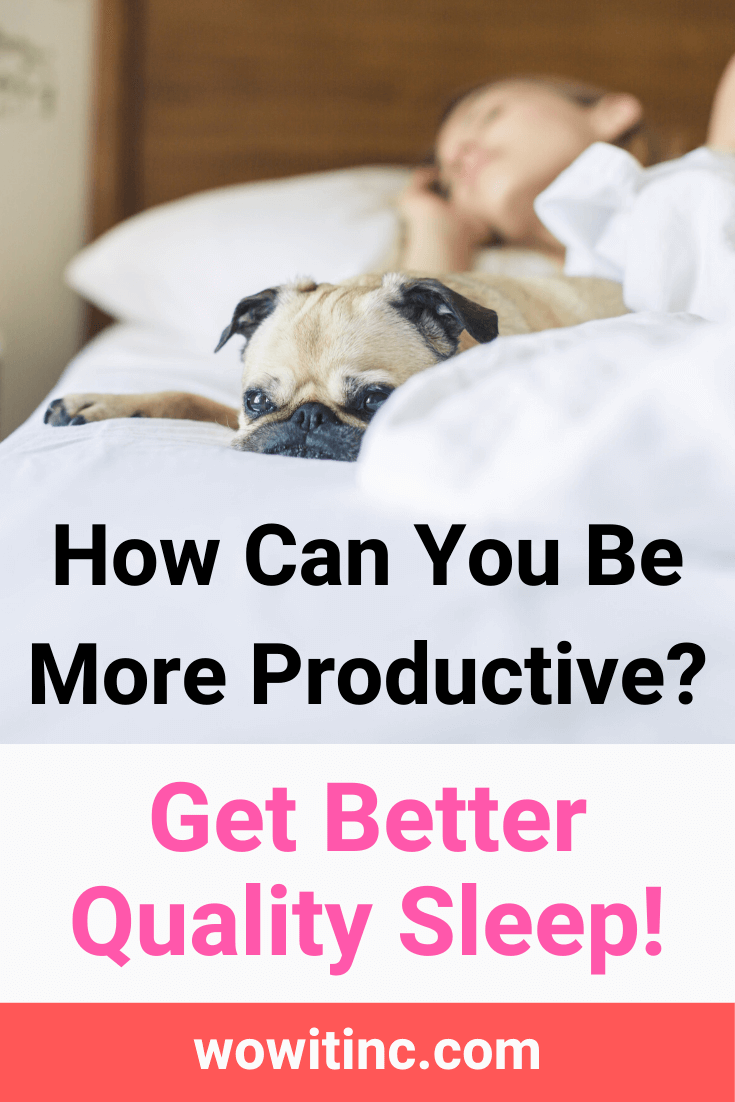How much sleep do you need to be successful and improve productivity? Is there a magic number of hours? Does one size fit all? What are the sleep habits of highly successful people?
The short answer – it depends on the individual. BUT a great deal of research has been done so we do have some guidelines to help us sleep better.
Dispel the myths
First of all, let’s address one myth. There is definitely NOT a magic number of hours that you should sleep. There is no one-size-fits-all approach when it comes to your sleeping habits.
You may have friends who seem to do well with just six hours of sleep. But you probably also know people who need eight hours of sleep to feel well-rested.
Consider Oprah Winfrey and Bill Gates. Although they’re close to the same age, they have very different sleep schedules. Oprah generally gets about five hours of sleep per night while Bill averages seven.
One thing is clear though, the amount you need does have a relationship to your age. We’re all aware, for example, that babies sleep significantly more than adults. This is necessary for their mental and physical development.
And that’s what we should be focusing on. Many people focus solely on the number of hours of sleep. Instead, we need to focus on the amount we need for our own mental and physical well-being.
The quality of your sleep affects the quality of your waking life.
Poor sleep quality affects you mentally, physically, and emotionally. The quality of your sleep affects the quality of your waking life.
It affects your productivity, your immune system, your creativity, your emotional responses, your weight, your energy level, mental alertness, physical response times, ability to handle stress, and much more.
So forget about the number of hours. If you want to have better sleep and be more productive, then focus on the quality and how you feel during the day. This is the best barometer for judging how much sleep you need overall.
Try the 5 Day Challenge – an email every day for five (5) days with easy to follow steps for you to implement to determine your optimal sleep pattern:
What factors affect your sleep?
You know that the quality of your sleep affects you all day long. So how is your day affecting your sleep?
Food and Drink
Everything you eat and drink throughout the day has an effect on how well you’ll sleep that night. Everything! I know, that’s rather daunting.
Obviously, you want to improve your consumption habits but I’ll focus on just a few key points:
- Caffeine – you need to limit your caffeine intake. This is much more critical in the latter part of the day. Generally, you don’t want to consume caffeine in the eight hours prior to attempting to go to bed for the night. And that’s not just coffee. That includes energy drinks and foods containing caffeine (like chocolate – sorry).
- Nicotine – you should not have any nicotine in the two hours before you plan to go to bed. This includes cigarettes, vaping, etc.
- Alcohol – you want to avoid alcohol in the two hours before sleeping. Alcohol may make you feel sleepy at first but it’s also responsible for restlessness, often waking you up during the night.
- Food – avoid heavy meals, sugar-laden foods, and too many fluids in the two hours before bedtime. Any of these could disrupt your sleep.
Exercise
It’s important to maintain an active lifestyle and that includes exercise. Research has proven you sleep better when your body has been active. However, it’s also important to avoid exercising within three hours of going to bed.
Exercise releases endorphins that elevate your mood and your alertness. This is the opposite of what you need when you’re trying to sleep at night.
Light
Your body sleep cycle is dictated by natural circadian rhythms. We follow a natural day-night cycle. During the day, try to ensure you expose yourself to sunlight or, at least, bright light to mimic daytime.
To get a good night’s sleep, your body is expecting a simulation of the night cycle. That makes light detrimental to your sleeping health.
You’ll want to avoid bright light in the evening as you approach bedtime. Specifically, you’ll want to avoid, or at least reduce, blue light.
Blue light is emitted by your electronic devices – TV, laptop, smartphone, etc.
Stress
One of the biggest challenges for many of us is turning off our minds. Forgetting the stresses of the day, ignoring the revolving todo list in our heads, and just shutting down.
However, it’s one of the biggest factors affecting our sleep every night.
How to develop an effective routine
A sleep routine, simply put, is just a set of activities you perform to prepare before you go to bed each night.
For a great example of good sleep routines, think about children aged 3 to 10. Typically, between these ages, parents implement very specific patterns designed to help wind-down the energy levels so children will sleep better.
The two most common elements in the patterns include a bath and reading a book. The bath is soothing and calming and reading the book helps slow things down even further.
Adults need to take the cue and implement their own sleep routines.
Recommended Routine
This is my own recommendation, based on research for this article but also my own years of trial-and-error experience.
This gives you a foundation, a starting point for your own experimentation.
- Expunge – I find it very useful to prepare for bed by relieving my brain of all my todos:
- Prepare lunches for the next day (one less thing to worry about in the morning)
- Confirm the outfits for the next day (again, one less thing to do in the morning)
- Ensure all required items (briefcase, purse, backpack, etc.) are at the exit door
- Write down or review all my todos for the next day. It’s calming to understand exactly what I’m dealing with – then I don’t think about it as much when I’m trying to sleep
- Tune out – turn off all electronic devices and dim unnecessary lights around one hour before bedtime. If this is a challenge then start small by getting an app that blocks blue light. For example, f.lux or Twilight. Another interesting option is the Philips Smartsleep Sleep and Wake-Up Light. This light is an alarm clock that simulates sunset and sunrise.
- Relax – listen to some (calming) music, read a book, take a hot shower/bath, do some stretching/yoga, try meditation, etc. Anything that calms the mind – find what works for you.
Whatever routine you develop, you want to ensure, as much as possible, you maintain the same schedule. You go to bed and get up at the same time each day. Our bodies like routine.
Improve your daily habits for better sleep
You’ll also want to try to improve your habits during the day to contribute to better sleep. Sleeping time and waking time are naturally linked – one affects the other.
- Food and drink – you’ve limited your caffeine, nicotine, alcohol, and food intake in the hours before you plan to go to bed
- Exercise – you get some exercise during the day but you ensure it’s not within three hours of going to bed
- Light – you get some exposure to sunlight or bright light during the day but you turn off lighting (including electronic devices) before bedtime
- Stress – you make a point of preparing for the next day so your mind doesn’t churn while you’re trying to sleep
How important is your sleep environment?
You’ve addressed some habits and hopefully, setup a sleep routine for yourself. Excellent!
What about your bedroom?
Your bedroom needs to be a sleep sanctuary. You want your mind to associate your bedroom with sleep. Well, sex too. But that’s not the topic… focus!
Most importantly, your bedroom should not make your brain think “breakfast” or “Netflix binge-watching” or “last-minute work on the laptop.”
To set the stage for sleeping, you want to have easy ways to control the lighting and the temperature and make the space cozy and inviting. Do that with:
- Black-out blinds – or heavy drapes or an eye mask or any other means by which you can make your bedroom dark and lightless for sleeping
- Thermostat – this is a hot topic for couples who often have different perspectives on the perfect temperature. But research indicates that cooler is better for the bedroom. Generally, @70°F or 20°C is the warmest recommended.
- Weighted blanket – this is a relatively new item for your consideration. They are said to simulate the feeling of being held (Deep Touch Pressure) and also help to reduce movement during sleep. Weighted blankets come in a variety of sizes, weights, and colours and even removable covers for washing.
Summary
Your quality of sleep affects almost everything you do. Even Elon Musk, notorious in the past for 80-plus-hour work weeks, has recognized he needs more.
You’ve read about the factors affecting your sleep including: food and drink choices and timing, exercise options, sunlight/bright light, and stress concerns. By choosing better options and paying attention to the timing for various activities, you can improve your sleep too.
Plus, you can start putting together a sleep routine that works for you. Finding ways to wind down at night and calm your mind before you go to bed.
Your bedroom, your sleep environment, plays a big role here. Working to make this an inviting space, conducive to sleep, will have huge benefits.
Better sleep leads to improved productivity. That’s good for you and for your family and for your company!
Like This Post? Put a Pin On It!
Did you find this article useful and helpful?
Share this WOWIT post on social media!
Have some suggestions of your own?
Click the Submit Comment button below to let us know!
Want More?
Would you like to learn more about this topic? Or perhaps explore some other topics? Choose from one of the categories below to see more:
Subscribe to our newsletter to have information delivered right to your inbox.



















